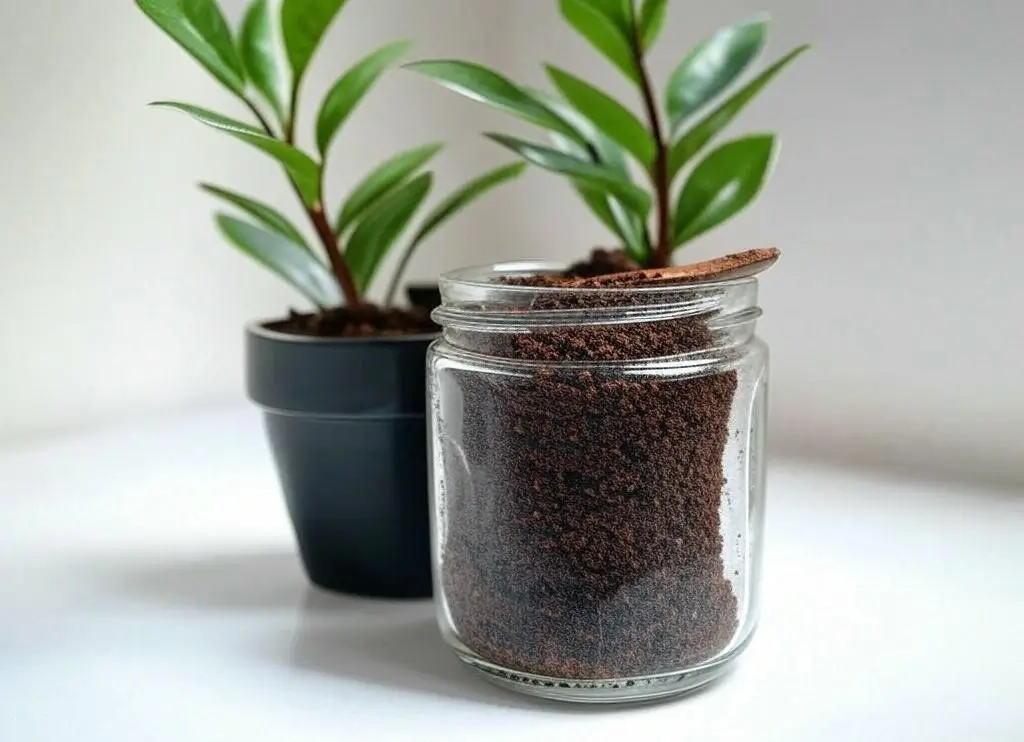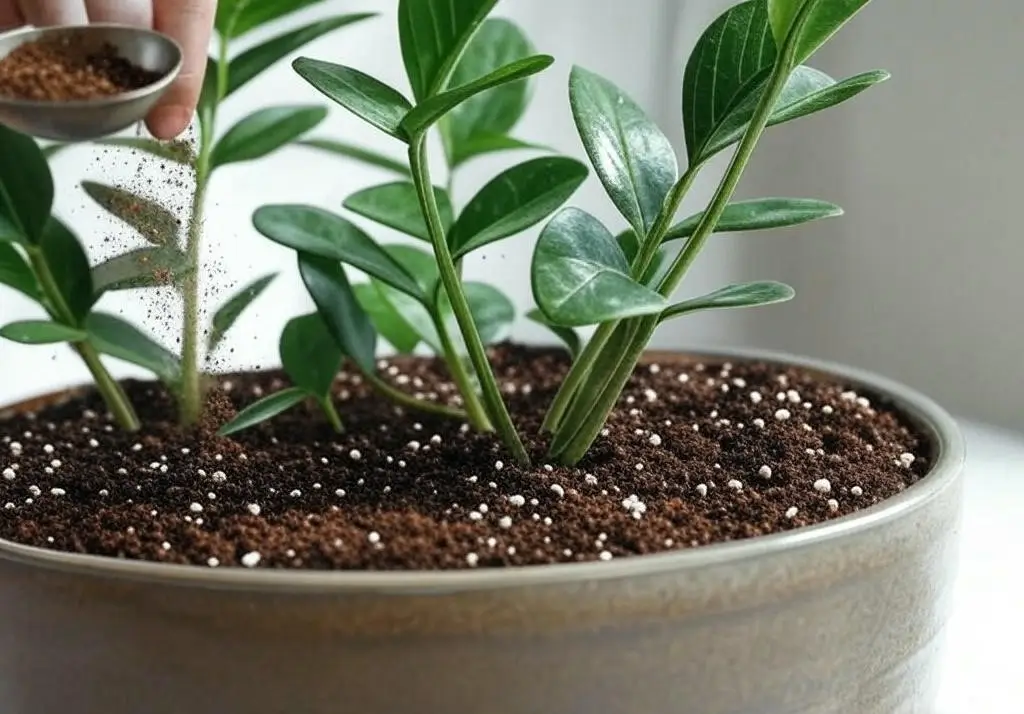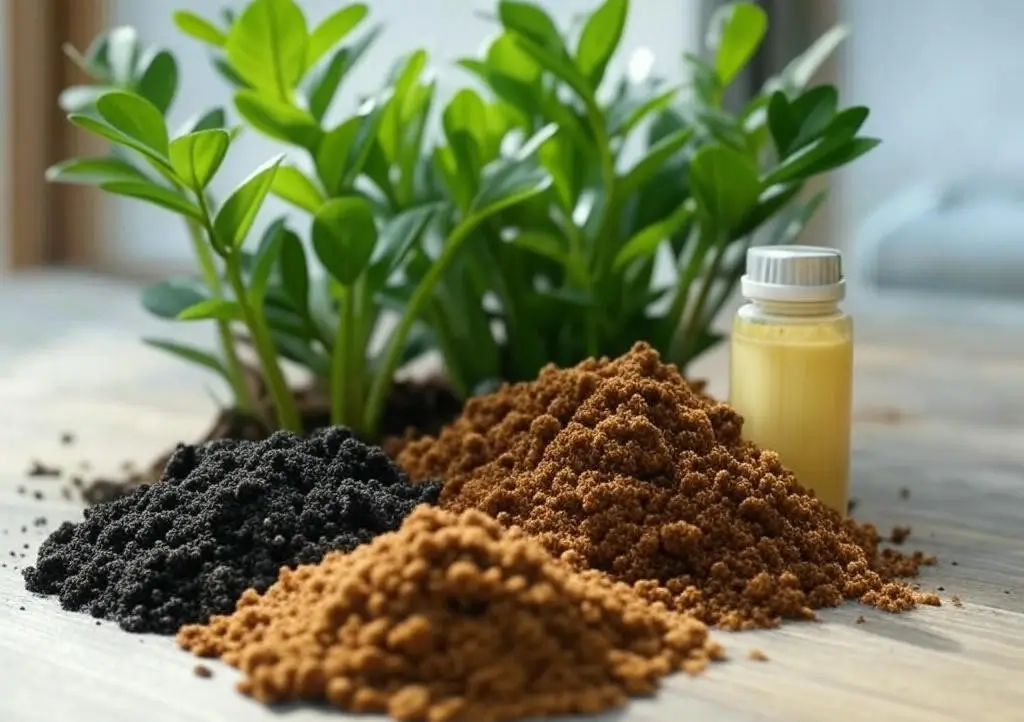You’ve probably heard that coffee grounds can work wonders for your garden, but what about your ZZ plant?
These tough, low-maintenance plants are known for their resilience, but they still need a little help from time to time.
So, what’s the deal with coffee grounds?
ZZ plants can benefit from coffee grounds when used sparingly, as they provide nutrients and improve soil texture.
Let’s dive into the benefits, risks, and best practices for using this everyday item to support your ZZ plant’s health.
Overview of ZZ Plant Care
ZZ plants (Zamioculcas zamiifolia) thrive with minimal fuss. They need low to medium light, occasional watering, and a cozy temperature between 65-75°F.
What makes them special is their resilience—they can handle low light and even a little neglect, which is why I love them for busy households.
Watering Needs of ZZ Plants
ZZ plants only need watering every 2-3 weeks. Overwatering is their biggest enemy because it can rot their roots.
I always make sure the soil dries out completely between waterings, and I use pots with drainage holes to keep things safe.
Well-draining soil is a must—think sandy or cactus mixes—to avoid soggy roots.
Fertilizing ZZ Plants
Fertilizing ZZ plants keeps them happy, but they don’t need much.
A balanced liquid fertilizer (like 10-10-10) works great once every month or two during spring and summer. I skip it in fall and winter when they’re resting.
The key is to not overdo it—too much fertilizer can burn their roots.
Repotting and Soil Requirements
ZZ plants love loose, well-draining soil. I use a mix of potting soil and perlite or sand to keep water flowing through.
Repotting every 1-2 years in spring helps them grow strong—it gives their roots room to stretch.
When I repot, I pick a pot just a bit bigger and watch them thrive.
The Role of Coffee Grounds in Gardening
What Are Coffee Grounds?
Coffee grounds are the leftover bits from brewing your morning cup. In gardening, they’re a free, natural boost packed with nutrients like nitrogen and potassium.
I collect mine in a jar and use them to perk up my plants—it’s simple and eco-friendly.

Benefits of Coffee Grounds for Plants
Coffee grounds help plants in big ways. They add nutrients, improve soil texture, and even keep some pests away.
Plus, they’re organic matter, which means they break down and feed the soil over time. I’ve seen them make heavy dirt looser and healthier.
Coffee Grounds as Fertilizer
Coffee grounds act like a slow-release fertilizer. Their nitrogen helps ZZ plants grow green and strong, especially leaves.
A study from Cornell University shows coffee grounds can boost soil nitrogen by up to 10% over time—pretty cool for something you’d toss out otherwise.
Can You Use Coffee Grounds for ZZ Plant Care?
Do ZZ Plants Like Coffee Grounds?
Yes, ZZ plants like coffee grounds when used the right way. They can benefit from the extra nutrients and better soil texture, but you’ve got to be careful not to overdo it.
I’ve tested this, and it works if you follow some simple rules.

Using Coffee Grounds with ZZ Plants
I sprinkle a thin layer of used coffee grounds—about a tablespoon—on top of the soil every few months. Then I mix it in lightly and water as usual.
Spring and summer are the best times since that’s when ZZ plants grow most.
Don’t pile on too much, or it can mess up the soil balance.
Coffee Grounds as Part of ZZ Plant Fertilization
Coffee grounds complement regular fertilizing for ZZ plants. They add a little nitrogen boost but won’t replace a full fertilizer.
I use them alongside my liquid 10-10-10 mix to keep things steady—coffee grounds are like a bonus, not the main meal.
The Pros and Cons of Using Coffee Grounds with ZZ Plants
Pros
Coffee grounds are a natural fertilizer with nitrogen and potassium. They add organic matter, improve drainage, and help roots grow strong.
I’ve noticed my ZZ plants look perkier when I use them sparingly.
Cons
Too many coffee grounds can make soil too acidic for ZZ plants.
They might also attract pests like gnats if left on top, and in humid rooms, mold can grow. I keep an eye on this and adjust if I see trouble.
Common Plant Care Myths
Misconceptions About ZZ Plants and Coffee Grounds
Do coffee grounds harm ZZ plants? No, not if you use them right—overusing them is the real issue.
Another myth is that coffee grounds fix every plant problem. They’re helpful, but not a miracle cure.
Myths About Using Coffee Grounds in Gardening
Some think coffee grounds work for every plant, but that’s not true. Acid-loving plants like azaleas love them, while others don’t.
Balance is key—too much of a good thing can throw off your soil.
How Coffee Grounds Affect Indoor Plants
Can Coffee Grounds Benefit Indoor Plants Like ZZ Plants?
Coffee grounds can benefit indoor plants like ZZ plants by adding nutrients and improving soil.
Indoors, though, you face challenges like less airflow, so I use them carefully. They help, but the trick is keeping things dry and clean.
Using Coffee Grounds for Houseplants
I mix a small amount of coffee grounds into the soil of my houseplants—about a teaspoon per small pot.
In tiny containers, I’m extra cautious because water sits longer. It’s all about light application to avoid buildup.
Benefits and Risks of Coffee Grounds in Indoor Plant Care
Coffee grounds improve indoor plant health with nutrients and better drainage when used sparingly.
But in humid homes, they can grow mold or fungus. I stick to dry, used grounds and watch for damp spots.
Alternative Organic Fertilizers for ZZ Plants
Other Organic Fertilizers for ZZ Plants
Worm castings, compost, and fish emulsion are great alternatives to coffee grounds.
Worm castings add nutrients slowly, compost builds soil health, and fish emulsion gives a quick boost.
I’ve tried them all, and they beat coffee grounds for consistency.

Which Fertilizers Are Best for ZZ Plants?
The best fertilizers for ZZ plants are balanced organic options like worm castings or a diluted fish emulsion.
I fertilize monthly in spring and summer, then stop in winter.
FAQs About ZZ Plant Coffee Grounds
Can I Use Fresh Coffee Grounds or Should They Be Composted First?
Fresh coffee grounds work, but composted ones are safer. Fresh grounds are stronger and can clump, while composted ones blend better. I dry mine out first to avoid mess.
How Often Should I Use Coffee Grounds for Indoor Plants?
Use composted coffee grounds no more than once a month to avoid over-fertilizing.
Are Coffee Grounds Bad for Plants with Acidic Soil?
Coffee grounds can harm plants that hate acidic soil, like succulents. They lower pH a bit, so I avoid them with plants that need neutral dirt.
What Other Indoor Plants Benefit from Coffee Grounds?
Spider plants and peace lilies love coffee grounds. They like the slight acidity and nutrients. I’ve seen them perk up with a light sprinkle.
What Plants Don’t Like Coffee Grounds?
Plants like tomatoes, carrots, garlic, roses, and Brassicas generally don’t thrive with coffee grounds due to acidity or soil compaction. Use with caution on houseplants sensitive to soil pH.
Wrapping Up
Using coffee grounds for your ZZ plant can be a great way to provide extra nutrients and improve soil texture—but moderation is key.
Too much can lead to problems like attracting pests or altering the soil’s acidity.
Keep it light, use coffee grounds sparingly, and always keep an eye on your plant’s health.
Try a small amount, observe your plant’s reaction, and feel free to mix in other options like worm castings if needed.
With the right approach, coffee grounds can give your ZZ plant the boost it needs to thrive.
Happy gardening!






